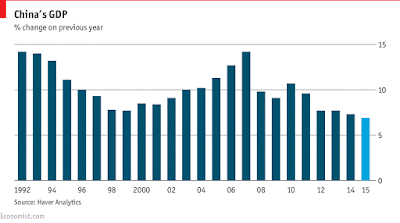The Conference Board argues that Chinese official data should be taken with some skepticism. Nothing new there. They have adopted a new measure, which suggests that implies “Chinese economic growth at a more realistic 3.7 percent” for the recent past. In this scenario, interestingly enough, “it’s likely that the bulk of China’s slowdown has already taken place since 2011, even if unapparent in official statistics.” So the picture is probably worse than the official one (from The Economist)
So China will grow at about 4% and has already been growing at that pace for a while, if one believes the Conference Board (in the official data above one might think there is more space for a slowdown, but clearly it has gone already down too). The big questions are whether this will continue, and what would be the impact for the global economy.

